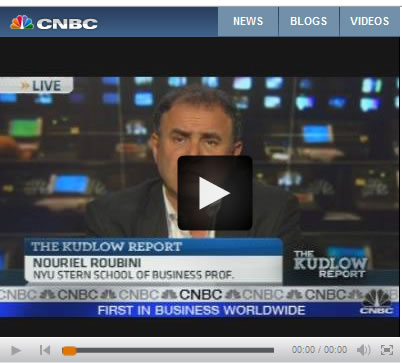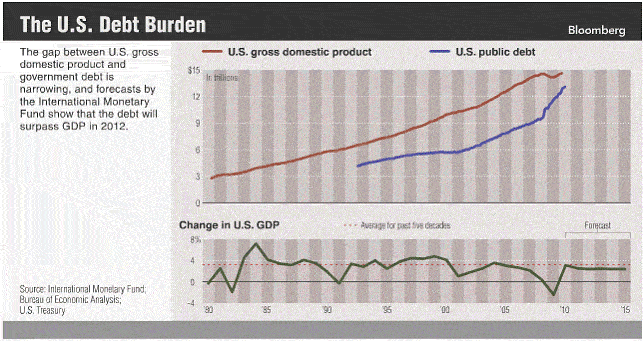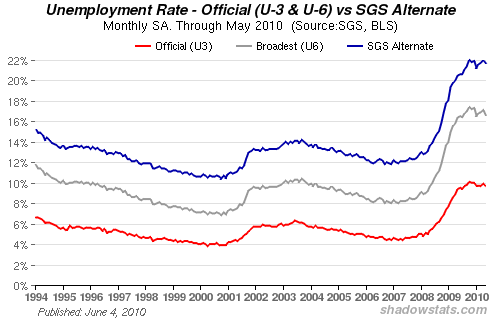Ferguson, Roubini vs. Krugman: Slowdown or Economic Depression for the U.S.?
Economics / Double Dip Recession Jun 30, 2010 - 06:03 AM GMTBy: Dian_L_Chu
 Paul Krugman, a strong supporter of fiat money, is obviously having a major distress over the G20 push to cut deficits in half by 2013, and stabilize the soaring U.S. debt. In his latest New York Times column, Krugman not only criticizes austerity measures, but also asserts that we are in the early stages of a third depression as a direct result of the spending cut.
Paul Krugman, a strong supporter of fiat money, is obviously having a major distress over the G20 push to cut deficits in half by 2013, and stabilize the soaring U.S. debt. In his latest New York Times column, Krugman not only criticizes austerity measures, but also asserts that we are in the early stages of a third depression as a direct result of the spending cut.
Perhaps because Krugman beat him to the punch with this ultimate Doomsday op-ed piece, on this very rare occasion, Dr. Doom--Nouriel Roubini--is actually a lot more optimistic about the economy in the United States when he spoke with CNBC last night.

Roubini - No Recession in The U.S.
In The Kudlow Report, Roubini says he does not see a double-dip recession in the U.S. Rather, the U.S. will experience a slowdown of around 1.5% GDP in the second half of this year, after growing 3% in the first half, he says.
At the same time, keeping up with his Dr. Doom reputation, Roubini does see a recession coming in the euro zone and Japan. There is a risk of a contagion effect to the U.S., which could lead to further correction in stock prices with a double-dip in Europe, Japan "falling off the cliff", and evidence of a slowdown in China.
Meeting Krugman sort of halfway, Roubini thinks fiscal austerity is needed in Greece, Spain and Portugal, whereas countries like Germany, Japan, China, should be doing fiscal stimulus.
Ferguson Worries about Europe Banks & U.S. Fiscal
Roubini's view is also shared by Harvard University professor--Niall Ferguson--who told CNBC in a separate interview that
"Right now the picture is definitely bleaker in Europe than it is in the US....I agree with Nouriel on this, it's not as if the US economy will contract, it will grow at a slower rate."
In addition to the debt woes in Europe, Ferguson is "nervous" about European banks, which were more leveraged than US banks. He noted the European governments do not have "very deep pockets" as most people have assumed, and Greek crisis revealed the limit of this largesse.
Even though compared with the euro zone, the economic picture in the U.S. does look relatively better; Ferguson said the horrendous fiscal situation means the US is likely to be faced with tough measures to cut the deficit over the longer term.
My Take - Difficult Balancing Act
Based on my biflation analysis, I believe the risk of deflation, not to mention depression, is highly overstated. As such, I don't see the U.S. going into another recession either, albeit slow and anemic growth into 2011 or 2012.
On the other hand, the U.S. deficit situation; however, is not something that may be rectified by more spending as suggested by Krugman.
Bloomberg's chart published on June 4 (below) shows the U.S. government’s total debt, which rose past $13 trillion for the first time this month, will surpass GDP in 2012, based on forecasts by the International Monetary Fund (IMF).
In a report for the Toronto summit, the IMF suggests "growth-friendly" policies such as shifting from income and payroll taxes to consumption taxes. In the United States, that might mean adopting a value-added tax (VAT) of up to 8% on all goods and services.
In the state of Texas, where there's no state income tax, the sales tax rate in the City of Houston is already at 8.25%. So, from my perspective, VAT would seem a path of least resistance to raise revenue than an income tax add or hike.
The idea of a VAT actually has gained some traction, including President Obama's Economic Advisor, Paul A. Volcker. However, the recent debate in Washington has become more focused on cutting Social Security, health benefits, defense spending and a freeze for other government programs.
Meanwhile, the employment malaise (see chart) suggests we might need a second stimulus spending since the first one was basically squandered away, as far as job creation is concerned. But Congress will likely balk at the added expense in an election year.
So, from all indications, it seems the U.S. most likely will only start slashing spending and implementing necessary measures--with some degrees of urgency--when coming under pressure from bond markets, similar to Greece and Spain.
Fortunately and unfortunately, one luxury of being such a big spender is that the U.S. practically holds its debtors hostage.
Nevertheless, the day of reckoning could be coming, probably as soon as the euro zone comes out of this crisis....one way or another.
Quote of the Day:
"People like Krugman living in glass towers at the New York Times or Princeton University need to understand that deficits do matter." ~ Niall Ferguson
Dian L. Chu, M.B.A., C.P.M. and Chartered Economist, is a market analyst and financial writer regularly contributing to Seeking Alpha, Zero Hedge, and other major investment websites. Ms. Chu has been syndicated to Reuters, USA Today, NPR, and BusinessWeek. She blogs at Economic Forecasts & Opinions.
© 2010 Copyright Dian L. Chu - All Rights Reserved Disclaimer: The above is a matter of opinion provided for general information purposes only and is not intended as investment advice. Information and analysis above are derived from sources and utilising methods believed to be reliable, but we cannot accept responsibility for any losses you may incur as a result of this analysis. Individuals should consult with their personal financial advisors.
© 2005-2022 http://www.MarketOracle.co.uk - The Market Oracle is a FREE Daily Financial Markets Analysis & Forecasting online publication.





